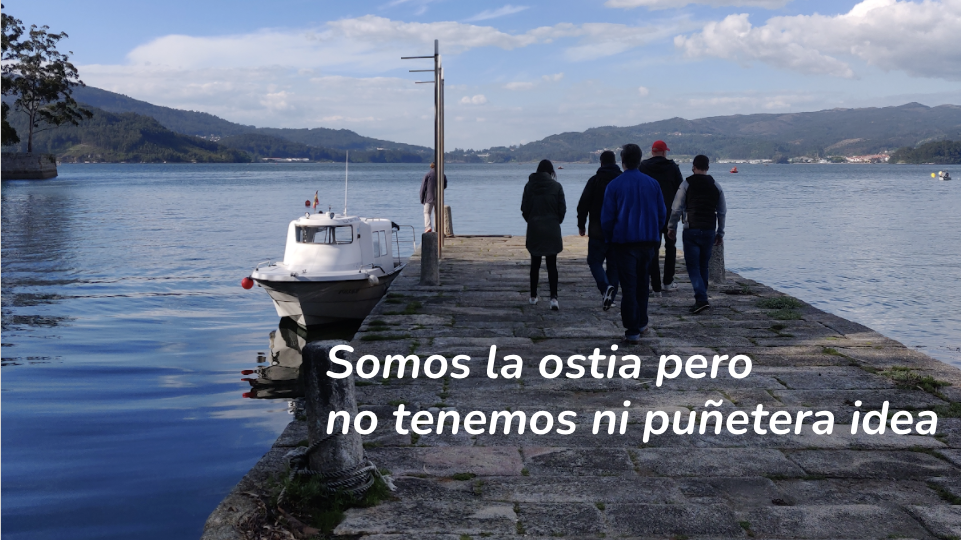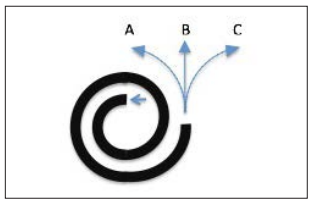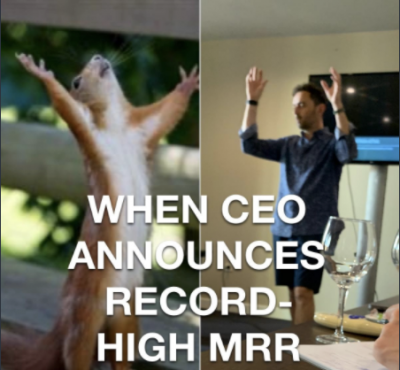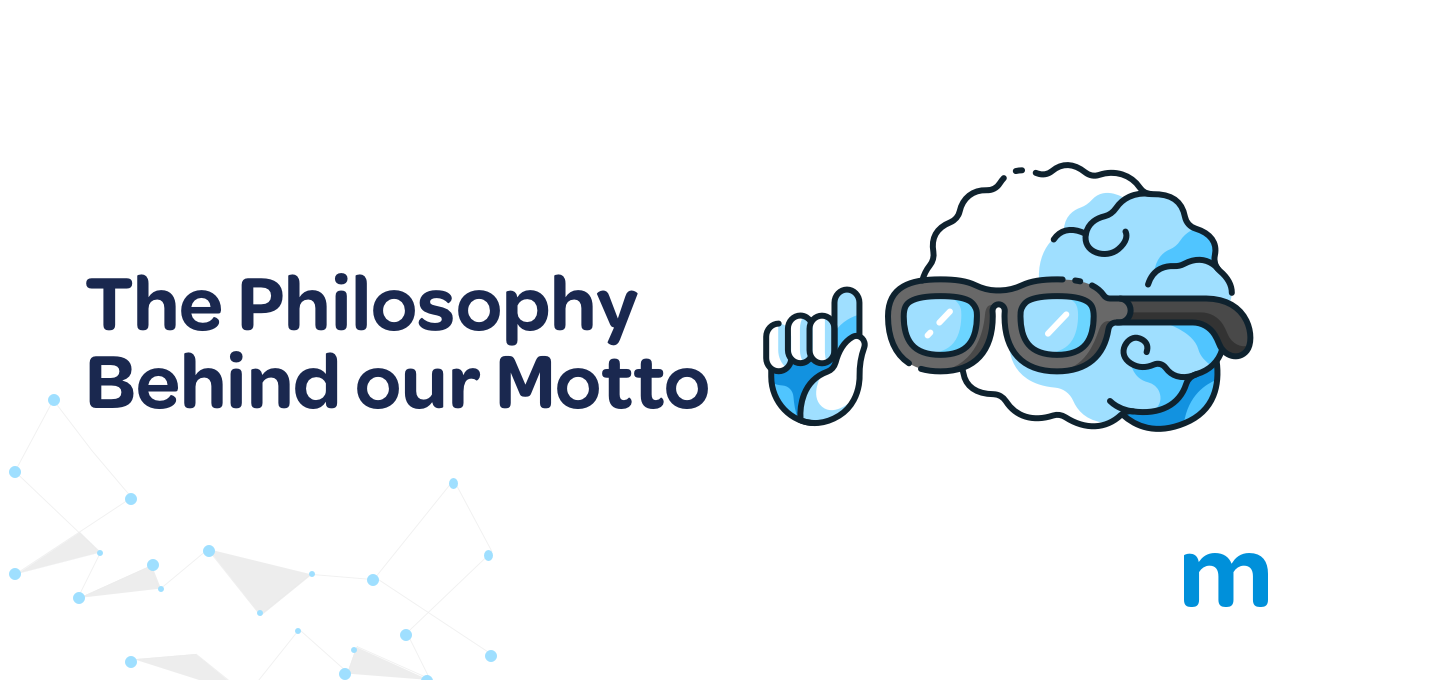What’s the philosophy behind our motto “Somos la ostia pero no tenemos ni puñetera idea”?

In a world with an increasing number of public facing people and gurus spitting their truths and lessons, we acknowledge that we are clueless – and that’s how this motto was born.
My son sometimes tells me that I speak more about philosophy than business when he asks me about marketgoo. As we are working on creating an enduring and unique culture (we have our own definition of that), I feel that reflecting about our behaviour gives us clarity and purpose. Call it philosophy.
The phrase “I know that I know nothing…” is attributable to Socrates. It seems that for him, the person does not own the truth at all. Actually, wisdom should come from recognizing our own ignorance. Socrates realized that, as opposed to others, he did not believe he was a wise person as the limits of knowledge were infinite. So Socrates’ wisdom implies he is an expert at nothing.
Nowadays we are flooded with experts at everything. The challenge with lessons from experts in our experience is that they have a strong bias. For example, most financing strategies or go-to-market best practices are not possible to apply to the model and niche we have decided to operate in.
If you want to run a franchise, following the master system is a must but if you want to create a unique company, you have to rethink and question any lesson you have been taught.
We are all confident idiots
Imagine that the illustration below represents a curved tube lying horizontally on a table. In a study of intuitive physics in 2013, Elanor Williams, Justin Kruger, and David Dunning presented people with several variations on this curved tube image and asked them to identify the trajectory a ball would take (marked A, B, or C in the illustration) after it had traveled through each. Some people got perfect scores, and seemed to know it, being quite confident in their answers. Some people did a bit less well—and, again, seemed to know it, as their confidence was much more muted.

But something curious started happening as they began to look at the people who did extremely badly on the little quiz: These people expressed more, not less, confidence in their performance. In fact, people who got none of the items right often expressed confidence that matched that of the top performers. Indeed, this study produced the most dramatic example of the Dunning-Kruger effect they had ever seen: When looking only at the confidence of people getting 100 percent versus 0 (zero) percent right, it was often impossible to tell who was in what group.
The Dunning-Kruger effect It is related to the cognitive bias of illusory superiority and comes from people’s inability to recognize their lack of ability. Without the self-awareness of metacognition, people cannot objectively evaluate their level of competence.
What this study illustrates is another general way in which humans frequently generate misbeliefs: We import knowledge from appropriate settings into ones where it is inappropriate.
Long term progress
We are aware of the context we are operating in. It is a fast technological moving market where growth and progress is key. But also we are aiming to have an enduring life in the industry. We don’t have an exit strategy or an investor agenda. Long term progress is what we aim for.
Nothing is more important to me as a leader than wisdom progress in the organization. To the point that I don’t care about hitting or smashing our goals in the short term if we can materialize our learnings.
Somos la ostia
Don’t ask me why, but one day, some time ago at the office (I can barely remember the origin story) we came up with the expression of “Somos la ostia pero no tenemos ni puñetera idea” which translates into something like “We are f****ing great, but we are clueless”. (It is nicer in Spanish, I have to say :D). And as time passed by the expression was informally used more often internally.
The birth of this phrase includes frustration, reflection and success and it falls under:
- Pride: celebration and recognition are key when you are working in a demanding tech company. Things move very fast so it is wise to stop often and realize proudly what a culture-focused group of people is capable of doing.
- Looking back to see how our team has improved in product development is amazing.
- Self recognition: The word self is key, which is great as we don’t have to wait for a manager to congratulate us. We formulate the recognition anytime we have a need for it.
- Sharing significant profit with the team, growing an average of 45% over the last 5 years, playing a global role in our industry and building an amazing group culture are great achievements.

- Failing and humble: it is a humble feeling to acknowledge that we don’t know a thing and that we can fail and learn.

- Like when we had to refocus our entire strategy twice despite having financial success. Avoiding creating a feeling of complacency just because we are surpassing targets. Or understanding that our future success depends on our current innovation. Being humble is being objective about the present state of your business.
- Vulnerable: in a world of ego, heroes, hustlers and vanity metrics, it is refreshing to expose ourselves in a trustful environment.
-
- We have created tools to perform retrospectives on projects and performance. This can be painful sometimes, but we try to operate blamelessly and keep improving. Some erratic product development activities in the past push us to root issues for the common benefit.
- Reflection: it shows reflection and self awareness. And reflection is key to progress by looking back to observe the decisions we made that made us who we are now.
- Asking questions often and reconsidering breaking some established but not quite best practices like we did with our Business development activities.
Ultimately this is part of our Culture, a self born component of our Culture that resonates with the values we have as a group and individually.
Some could say we should aspire to reach the “Somos la ostia” stage. But maybe that would be the end of the game – and we are having fun playing it.










